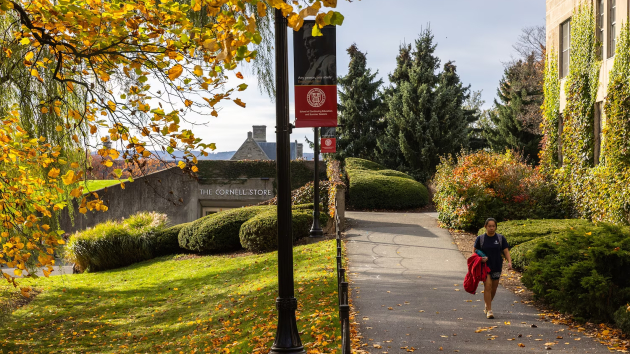Airlines cancel hundreds of flights Friday amid shutdown-related FAA reductions
Written by ABC Audio. All rights reserved. on November 7, 2025
(WASHINGTON) Officials decided to gradually increase air travel reductions to 10% after the safety team determined it would be the safest approach, Transportation Secretary Sean Duffy told reporters at Reagan National Airport.
Major airlines say they are planning to cancel hundreds of flights on Friday — out of thousands of daily flights — as the Federal Aviation Administration is set to begin limiting flight capacity at 40 major U.S. airports amid the government shutdown.
If the government shutdown continues, more air travel reductions could be on the way, Duffy said.
“I want it to be fixed, but also I have to continue to look at data and if this continues, and I have more [air traffic] controllers who decide they can’t come to work and control the airspace, but instead have to take a second job, with that you might see 10% would have been a good number, because we might go to 15% or 20%,” Duffy said.
This could likely cost airlines tens of millions of dollars, Duffy said.
The initial plan called for a 10% reduction starting Friday, but officials chose to gradually increase the reductions for safety, Duffy said.
Loss of separation — the minimum distance kept between aircrafts to keep them safe — in the airspace and complaints from pilots about stress from air traffic controllers are among the data points that led to the decision to reduce air travel, Duffy said.
“We’ve seen more breaches in regard to that loss of separation, we see more incursions on tarmac throughout the country, and we have more complaints from pilots about stress from air traffic controllers, and more complaints about the lack of responsiveness from controllers,” Duffy said.
“That data is going in the wrong direction, not in the right direction, which made us make the decision we have to actually take additional measures to reduce the pressure in our system,” Duffy said.
As of 2:30 a.m. ET on Friday morning, at least 814 flights within, into or out of the United States have been cancelled so far, per FlightAware
American Airlines said Thursday it will cancel about 220 of its roughly 6,000 departures starting Friday and lasting through this weekend.
United Airlines said in a statement it plans to cancel less than 200 of its more than 5,000 flights each day through the weekend. The airline has listed the flight cancellations on a special website along with other information for travelers.
A company spokesperson told ABC News that about half of customers who had their flights canceled were able to be rebooked within 4 hours of their original departure time.
Delta Airlines said it planned to cancel about 170 daily flights.
American, United and Delta — the three largest airlines in the U.S. — all have said they believe they will be able to accommodate most of the impacted passengers on other flights.
The cancellations are the latest — and perhaps biggest — disruption to air travel since the government shutdown began more than a month ago.
The FAA decided not to cut any international flights as it would be a violation of international agreements with the countries, according to Duffy.
“We have international agreements that we abide by, and because of those international agreements, I’m not going to impact those international flights. And because if I do, what will happen is we have other countries that are waiting to have a breach of those contracts from the US so they can cut down American flights, and then that would have a very long lasting impact on our ability to to to send travelers from the U.S. to those partners that have the agreements,” Duffy said.
Duffy said he has spoken to President Donald Trump about the flight reduction decision and that the White House is “fully read in” on it.
“The White House also looks to the safety team to help us make the right decisions to do the best we can to keep people safe. But there’s an easy answer. There’s an easy answer, open up the government, stop this,” Duffy said.
What travelers are saying
Travelers began to be notified of the canceled flights on Thursday.
Caitlin Ladner, in Wisconsin, said she had planned to fly to Raleigh, North Carolina, on a Friday for a trip to surprise her parents with her sister but got a notice about her canceled flight on the United app.
“We’ve been planning it for a while …. It’s pretty upsetting,” she told ABC News.
Despite an offer to reschedule her flight, she said she decided to cancel it altogether.
“I don’t know when all this is going to end,” she said.
Meanwhile, other travelers across the country on Thursday were bracing for delays — and trying to make it home before the cancellations started.
At Reagan National Airport, just outside Washington, D.C., Frederick Ross, from Fort Myers, Florida, told ABC News the current travel headaches have him rethinking his upcoming holiday travel plans.
“It’s a big factor to have to possibly deal with delays and cancellations, and talking about traveling with the whole family, it’s easier to just take a road trip,” he said.
FAA order limits flights
The FAA said earlier this week it was reducing flight capacity at 40 major airports across the country to alleviate staffing pressures. The reductions this weekend are starting out at 4% but will eventually climb to 10%, federal officials said.
Under an emergency order issued by the FAA on Thursday, airlines are required to reduce operations at the 40 “high-impact airports” by 6% by Nov. 11 and by 10% by Nov. 14. Any airline that does not comply will be fined $75,000 per flight over the limit, according to the FAA order.
That announcement came after Transportation Secretary Sean Duffy said earlier that the FAA would be forced to shut down the airspace in some areas if the shutdown continues into next week, warning of “mass chaos.”
Staffing shortages among air traffic controllers has been an ongoing concern and there have been scattered flight delays and cancellations over the past several weeks, as the shutdown has stretched on.
Last weekend, a surge in callouts among air traffic controllers led to strained staffing at multiple airports across the U.S. — including in the New York City area where 80% of controllers were absent at one point, the FAA reported.
Air traffic controllers, who are required to work without pay for the duration of the shutdown, are credited with helping end the most recent shutdown in 2019, when a series of absences delayed flights and heightened pressure on members of Congress.
The precise impact the flight cancellations will have on overall air travel is unclear.
“We’re not in the peak of summer, we’re not over a holiday period. So we feel confident that we have enough seats in these markets to accommodate all travelers,” United’s chief customer officer, David Kinzelman, told ABC News.
“There will not be chaos over the weekend,” he said, likening the impact of the reductions to a “medium-sized storm.”
He added, “We are going to cancel flights that we think have the least amount of disruption for customers. If you’re in a market with only two small regional flights and you cancel one or both of them, that’s a huge impact to that market. We want to avoid that. And so what we’re doing is really spreading it around the system.”
ABC News’ Ayesha Ali, Sam Sweeney and Rachel Scott contributed to this report.
Copyright © 2025, ABC Audio. All rights reserved.





